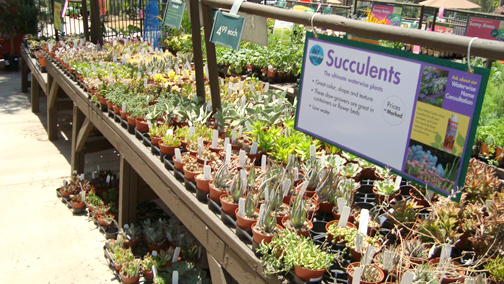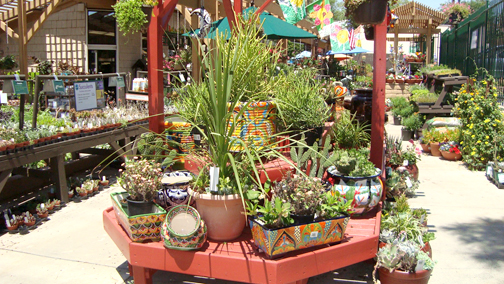
By Jason KUROSU
California’s mandatory water restrictions continue to have cities across the state exploring methods for conservation during the worst drought in state history.
The City of La Cañada began using recycled water to irrigate its medians, forbidding the use of potable water for street landscape irrigation. The Crescenta Valley Water District has restricted outdoor irrigation to two days a week beginning in April, moving to the Orange Alert level of water rationing. Glendale Water & Power adopted similar measures, entering its third phase of water conservation restrictions on April 28.

Armstrong’s Garden Centers have expanded their succulent offerings since the onset of the drought.
Glendale Water & Power customers are limited to watering two days a week, Tuesday and Saturday before 9 a.m. and after 6 p.m. Glendale began Phase II conservation measures on July 29, 2014, resulting in 12% reduction in water usage, according to the city. Phase II came with the institution of a drought fee of 75 cents per 100 cubic feet of water used. Repeat violations of the city’s water conservation ordinance may see fines as high as $1,000.
An increased Phase III drought charge of $1.30 per 100 cubic feet of water used could take effect should the city council approve. Discussions on the drought charge have been postponed until at least October, though.
Locally, residents and businesses have also been working to do their part on the conservation front.
Lina Wallace, co-owner of La Fleur Pastry in Montrose, switched the plants in front of the store to more water-wise plants in November, a move that maintains the aesthetics of the business while saving water.
“I only have to water them twice a week, even just once a week sometimes,” said Wallace.
Paula Higdon, nursery professional at Armstrong’s Garden Centers in La Cañada, said that demand for drought-resistant plants and artificial turf has noticeably increased since the drought began.
“We’ve really expanded our succulents section. We’ve always had it, but it was never quite this big,” said Higdon of the desert-themed area of the store that now dominates a corner of the nursery.
Here customers can find drought-tolerant plants like aloe, cacti, crassula and echeveria, among others.
Armstrong’s Garden Centers is also offering water-wise home consultation for homes within 10 miles of an Armstrong’s Garden Center. Nursery professionals can come to a customer’s home and offer tips on a more effective sprinkler system, plant groupings and other water-saving options.
How long Californians will need to adopt such conservation measures remains unclear. Gov. Jerry Brown’s mandatory water restrictions call for a statewide 25% reduction in water use by Feb. 28, 2016. Even if that mark is achieved, Californians may have to maintain disciplined attitudes towards water use well into the future.


